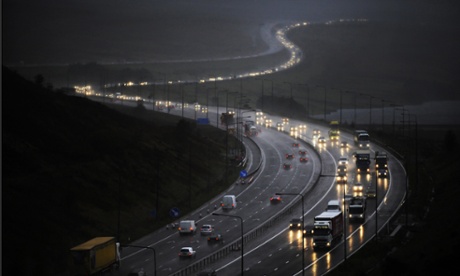
The chancellor, George Osborne, is joining city leaders from across the north on Friday to unveil a comprehensive strategy for transport in the region, including potential new rail routes and a possible road tunnel through the Peak District.
The report from Transport for the North – the new body of combined authorities – proposes cutting journey times with high-speed railways, new road connections, and Oyster-style smartcards and simpler fares throughout the region.
The blueprint has been met with scepticism by campaigners and railway trade unions, who described the plans as “fanciful electioneering”.
But Sir Richard Leese, chair of TfN and leader of Manchester city council, said it was a long-term vision. “What is absolutely vital is securing long-term, cross-party support around our investment plans, which run for at least the next 15 years, and the delivery can’t change with every election.”
Having backed a third high-speed railway line for the UK – the trans-Pennine rail link – last autumn, Osborne will be in Manchester to endorse the strategy, which could connect the cities of the north at speeds of up to 140mph.
The entire proposed “TransNorth” network would not come cheap: options drawn up by Network Rail to speed up travel between Liverpool, Manchester, Sheffield, Leeds, Newcastle and Hull cost a total of £65bn with new high-speed tracks, or a slower version costing about £25bn through upgrades.
Osborne’s firm spending pledge to date is limited to £12.5m for “development work” on the report’s strategic options across road and rail.
The chancellor said: “Connecting up the great cities of the north is at the heart of our plan to build a ‘northern powerhouse’. This report has the potential to revolutionise transport in the north and we will work closely with Transport for the North to help make it a reality.”
The transport secretary, Patrick McLoughlin, said the report showed the coalition was planning for growth in a “new joined-up way” and would “help the north pool its strengths”. He said: “The proposals announced today will reduce journey times, while increasing capacity and connectivity, enabling growth.”
His Labour shadow, Michael Dugher, called it a desperate, last-ditch attempt to win votes, adding: “People in the north won’t be fooled by a so-called strategy that falls well short of what is needed.”
Mick Whelan, general secretary of the Aslef union, said the new rail plans were “fanciful in the extreme” and said Osborne was performing a “blatant piece of post-budget electioneering”.
McLoughlin will pledge to speed up work on a northern section of the second high-speed rail line – HS2 – and to take immediate action to streamline and simplify rail fares, including developing a contactless travel card that could be used across northern cities.
The road strategy will include work already announced to widen more of the motorway network to four lanes on the M62, M6, and M1, and plans for a £6bn road tunnel under the Peak District to join Manchester and Sheffield, for which a feasibility study was announced in December.
The Campaign for Better Transport said it welcomed the report and moves towards an integrated transport system, but warned that the proposed tunnel under the Peak District would undermine other measures: “New roads create new traffic, and will not help to solve the region’s needs for a sustainable transport system,” the campaign group said.

